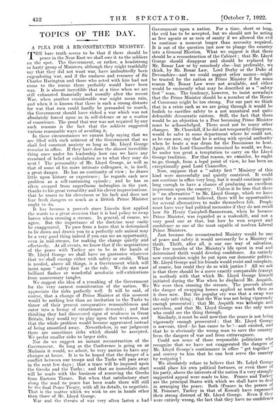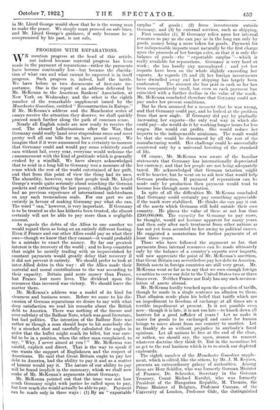TOPICS OF THE DAY.
A PLEA FOR A RECONSTRUCTED MINISTRY.
rr HE bare truth seems to be that if there should be peace in the Near East we shall owe it to the soldiers on the spot. The Government, or rather, a headstrong or hasty group of Ministers, although they might truthfully say that they did not want war, have undoubtedly been engendering war, and if the coolness and resource of Sir Charles Harington and those who acted with him had not come to the rescue there probably would have been war. It is almost incredible that at a time when we are still exhausted financially and morally after the recent War, when another considerable war might mean ruin, and when it is known that there is such a strong distaste for war that men could hardly be persuaded to march, the Government should have risked a war which was not absolutely forced upon us in self-defence or as a matter of conscience. The proof that war was not required by any such reasons is the fact that the soldiers suggested various reasonable ways of avoiding it.
In these circumstances we cannot help saying that we are filled with such mistrust of the Government that we shall feel constant anxiety so long as Mr. Lloyd George remains in office. If they have done the almost incredible thing once under his leadership how can we have any standard of belief or calculation as to what they may do next ? The personality of Mr. Lloyd George, as well as that of some of his more intimate colleagues, is, in itself, a great danger. He has no continuity of view ; he draws little upon history or experience ; he regards each new problem as a self-containing episode: and he has so often escaped from superfluous imbroglios in the past, thanks to his great versatility and his clever improvisations. that he trusts to his cleverness or his luck and does not fear fresh dangers so much as a British Prime Minister ought to do.
It has become a proverb since Lincoln first applied the words to a great occasion that it is bad policy to swap horses when crossing a stream. In general, of course, we a But the importance of the doctrine may easily be exaggerated. To pass from a horse that is determined to lie down and drown you to a perfectly safe animal may be a very good thing indeed if you can see an opportunity, even in mid-stream, for making the change quietly and effectively. At all events, we know that if the negotiations of the peace with Turkey are to be in the hands of 'Mr. Lloyd George we shall have no guarantee whatever that we shall emerge either with safety or credit. What is needed, above all things, is a Government which will insist upon "safety first as the rule. We do not want brilliant flashes or wonderful acrobatic self-extrications from unnecessary tangles. We suggest the idea of a remaking of the Government for the very earnest consideration of the nation. We appreciate the risks perfectly well. It will be said, of course, that a change of Prime Minister at this moment would be nothing less than an invitation to the Turks to throw off their present comparative reasonableness and enter into a frenzy of extortionate demands ; and that thinking they had discovered signs of weakness in Great Britain, they would try to play upon that weakness, and that the whole problem would become aggravated instead of being smoothed away. Nevertheless, in our judgment there are sometimes risks which should be accepted. We prefer smaller risks to larger risks. Nor do we suggest an instant reconstruction of the Government. So long as the Conference is going on at Mudania it would, we admit, be very unwise to have any changes at home. It is to be hoped that the danger of a conflict between our troops and the Turks will pass away in the next few days • that a truce will be imposed upon the Greeks and the Turks ; and that an immediate start will be made with the business of removing the Greeks from Eastern Thrace. But when that satisfactory start along the road to peace has been made there will still be the final Peace Treaty, with all its details, to negotiate. That is the matter which we wish to see in hands other than those of Mr. Lloyd George. War and the threats of war very often fasten a bad Government upon a nation. For a time, short or long, the 'evil has to be accepted, but we should not be acting as free agents or as men of sanity if we allowed the evil to continue a moment longer than necessity required. It is out of the question just now to plunge the country into a General Election. What we suggest is that there should be a reconstruction of the Cabinet ; that Mr. Lloyd George should disappear and should• be replaced by Mr. Bonar Law or by somebody else—but preferably, we think, by Mr. Bonar Law. Lord Derby or the Duke of Devonshire—and we could suggest other names—might be trusted by the nation as Prime Minister if for some reason Mr. Bonar Law were not available, and either would be eminently what may be described as a "safety first" man. The tendency, however, to insist nowadays that the Prime Minister should be a member of the House of Commons might be too strong. For our part we think that in a crisis such as we are going through it would be foolish to sacrifice safety to a not unnatural and quite defensible democratic custom. Still, the fact that there would be an objection to a Peer becoming. Prime Minister must be acknowledged. There need not be many other changes. Mr. Churchill, if he did not temporarily disappear, would be safer in some department where he could not, as he can now, say that he is acting with special authority when he beats a war drum for the Dominions to hear.
Again, if the Lord Chancellor remained he would, we fear, be under too great a temptation to carry on the Lloyd George tradition. For that reason, we consider, he ought to go, though, from a legal point of view, he has been an exceptionally good Lord Chancellor.
Now, suppose that a "safety first" Ministry of this kind were successfully and quietly contrived. It could not continue in office very long, but it would continue quite long enough to have a chance of producing an excellent impression upon the country. Unless it be true that there is no alternative" to Mr. Lloyd George, which we have never for a moment believed, there will be opportunities for several alternatives to make themselves felt. People must have very bad political memories if they do not recall how Sir Henry Campbell-Bannerman, when he became Prime Minister, was regarded as a makeshift, and not a very good one at that, but how he won respect and confidence as one of the most capable of modern Liberal Prime Ministers.
Just because the reconstructed Ministry would be one of peace and safety it would necessarily be a Ministry of thrift. Thrift, after all, is our one way of salvation.
The few months of the Ministry's life spent in real and determined thrift would develop confidence. An entirely new complexion might be put upon our domestic politics. Mr. Lloyd George and his friends would resist and complain, of course, but could they do so with justice ? All we ask is that there should be a move exactly comparable (except in method) with that which Mr. Lloyd George himself initiated during the War when he displaced Mr. Asquith. We were then crossing the stream. The proverb about the danger of swapping horses applied as much then as it does now. But the popular cry was that a swap was the only safe thing ; that the War was not being vigorously enough prosecuted ; that Mr. Asquith was lethargic and nerveless, and that Mr. Lloyd George was the only man who could see the thing through. Similarly, it must be said now that the peace is not being vigorously enough prosecuted ; that Mr. Lloyd George is nervous, tired—he has cause to be !--and excited, and that he is obviously the wrong man to save the country from the dangers of war and from extravagance. Could not some of those responsible politicians who recognize that we have not exaggerated the dangers of Mr. Lloyd George's continuance in office "get together' and convey to him that he can best serve the country by resigning ? We absolutely refuse to believe that Mr. Lolyd George would place his own political fortunes, or even those of his party, above the interests of the nation if a very strongly supported appeal were made to him. France and Turkey are the principal States with which we shall have to deal in arranging the peace. Both (France in the person of M. Poincare, Turkey in that of Kemal) have expressed their strong distrust of Mr. Lloyd_ George. Even if they were entirely wrong, the fact that they have no confidence in Mr. Lloyd George would show that he is the wrong man to make the peace. We simply must proceed on safe lines, and Mr. Lloyd George's guidance, if only because he is compromised by his past, is not safe.







































 Previous page
Previous page